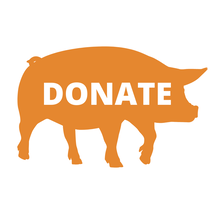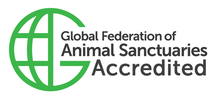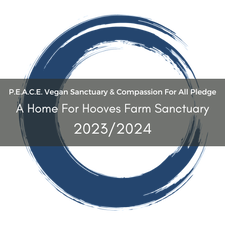Capital Campaign FAQ
We recently conducted a feasibility study for our campaign and below are the questions provided by our supporters.
Why is A Home for Hooves Farm Sanctuary conducting a capital campaign?
Over the past year, we have significantly outgrown our currently leased 4.47-acre property. It is vital that the sanctuary moves to a much larger location, ideally greater than 40 acres, in order to improve the lives of our current residents and to provide a safe haven for more farmed animals in need. With overly 170 farmed animals in our care, and 6 different foster homes, it’s imperative that we move to a much more functional location that can house all the animals we are responsible for. The current location is also owned by the founder of A Home for Hooves, so it is important for the new location to be owned by the charity in order to ensure stability and longevity.
What is your fundraising goal?
Our capital campaign goal is to raise 3.0 million dollars by April 30. This will enable us to purchase property large enough to meet our needs and to put in the necessary fencing infrastructure required prior to moving the animals to their new forever home.
How close are you to your fundraising goal?
To date we have raised $2,350,000 for the new property, which is over three quarters of our fundraising goal.
Is this campaign achievable and in what timeline with forecasted fundraising?
Yes, this is absolutely achievable. We have an incredible amount of community support and we have raised over 2 million dollars for this endeavor.
What is the plan for raising the money?
There are several initiatives under way to help raise funds for our capital campaign including: sending letters of inquiry to foundations with a history of donating to animal charities as well as family run foundations in BC, researching and applying for grants, fundraising events, and approaching our donors for support.
Are government grants an option?
Government grants for capital campaigns are very limited for farm animal rescue and we have not been able to find a government grant that would support a capital campaign.
Is it possible to have the land donated in return for a tax receipt?
We have tried this approach on several occasions, but have not been able to find an individual or corporation willing to make this kind of donation.
Where will the new property be located?
The new property will be located in Duncan.
Real Estate on Vancouver Island is very expensive. Is it realistic to be buying a large property here?
Purchasing a property on Vancouver Island is the most responsible thing we can do for the animals in our care. In order to ensure the stability and safety for the current and future sanctuary animals, the charity must own the property. We currently have $2,350,000 set aside in a reserve fund for this purchase, and we are confident we will reach our goal.
Is a long term lease or more foster homes an option?
No, these are not viable options. With a lease, there is too much risk involved with the possibility of having to move on short notice if the lease was terminated early. This can occur under certain circumstances such as the landlord moving onto the property or having a family member move there. There would also be restrictions in regards to what we can build because any structures that would increase the value of the leased property would be owed back to the charity, by the landowner, upon termination of the lease.
Having multiple foster homes is not ideal because there is a lot of time spent travelling when the animals require attention from members of our team or for supply deliveries. Foster homes are also not stable and it’s difficult to find suitable homes for farmed animals.
Having multiple foster homes is not ideal because there is a lot of time spent travelling when the animals require attention from members of our team or for supply deliveries. Foster homes are also not stable and it’s difficult to find suitable homes for farmed animals.
Will the new property be adjacent to the current property?
No. The current sanctuary does not have a suitable property beside it that would meet the size requirements of our new home because the lots are only 4.5 acres each and the property owners have no plans to sell.
Is there a potential property that you have in mind?
Yes, there is a 40-acre property we have signed a purchase agreement for. We will know by the end of February if we can remove all conditions to complete the purchase.
Who makes the decisions and has the oversight for the capital campaign?
The Home for Hooves Board of Directors has oversight of the capital campaign. For the duration of the campaign, the overall fiduciary and operational responsibilities sit with the members of the Home for Hooves board. This group provides the ongoing leadership needed to ensure transparency and integrity over the life of the campaign’s key priority areas. The board will ensure that the funds raised are managed effectively in accordance with CRA rules and the capital campaign’s purpose. There is also a Capital Campaign Cabinet that acts in a planning capacity to move the campaign plan and strategy forward. The Capital Campaign Cabinet is made up of two board members and 6 volunteers who are incredibly hardworking and enthusiastic about our mission.
If we donate to this capital campaign are we buying the founder and her family a new home?
No. The new property will be owned by the charity and anyone living on the property will be required to pay monthly rental fees or a lease to live on the property.
Who will own the new property?
Currently the sanctuary is located on the founder’s property, but this new location will be owned by the charity which is governed by a 6 person board of directors. It is incredibly important that the sanctuary is not resting on one person’s shoulders (i.e. the founder), which is why the new property must be owned by the charity and not the founder of A Home for Hooves. The main reason for farm sanctuaries shutting down in Canada is because the sanctuary is located on one individual’s property and they no longer want to or are able to run it. Having the property owned by the charity and run by a board of directors who are neutral and impartial ensures stability and safety for the animals.
What will happen with all the infrastructure at the current sanctuary?
All of the shelters, buildings, and fences will be moved to the new location.
What if something happens to the founder after the Sanctuary has moved to the bigger property?
The property will be owned by the charity, which is why it’s so important for the sanctuary to make this move. The charity is run by a 6 person board of directors and there is a contingency plan in place, which is also a requirement of our accreditation with Global Federation of Animal Sanctuaries. The founder also has a $500,000 life insurance policy for the sanctuary, which will ensure financial stability in the event of her passing. If something happened to the founder, there is minimal risk for the animals because they will still have their forever home and key members of the Home for Hooves team would ensure operations would continue to run smoothly.
The community is still in shock at the closing of the other sanctuary and that Home for Hooves had to step up to take all their animals. How can you ensure this won’t happen with A Home for Hooves?
A Home for Hooves is run by a board of directors who ensure the sanctuary runs as smoothly and efficiently as possible. Moving the sanctuary to a property that is owned by the charity is the best way to ensure stability. The sanctuary founder is still well and able to oversee the operations, but the biggest risk right now is accidental death (i.e. car accident). Also, the founder, Michelle Singleton, actively mentors members of the Home for Hooves team to ensure a seamless transition if necessary.
Have you tried reaching out to celebrities or corporations who support animals for donations?
We have tried to approach a few celebrities for support, but they or their foundations are already involved in capital campaigns for other organizations. Our capital campaign cabinet is actively brainstorming and will be approaching corporations who support animal charities.
How do you plan on promoting this project?
We will be promoting the project via social media, our website, advertising, direct mail, media, events, and exhibitions.
With more space and more animals, where are more volunteers going to come from or do you have enough now?
We will definitely need more volunteers once we move to a larger location. This will be attained through social media and our google ad grant. We will also structure the property in a fashion that will be more functional and efficient than our current location. We also plan on scheduling monthly work parties for larger projects.
How much space do the animals need?
- One cow requires a minimum of 1 acre of pasture, but 2 acres per cow is strongly preferred
- Two goats or two sheep require 1/2 an acre of land
- Eight pigs require 1 acre of land
- One mini donkey or mini horse requires 1/2 an acre of land
Are you growing too big too fast?
We are very cautious to grow at a pace that is safe and sustainable. Before any animal is taken into our care, a form with 27 questions is completed by the founder. These questions address finances, veterinary care, space, volunteer pool, knowledge of care, ability to provide high quality care, and impact to the other animals. This questionnaire is then sent to the board of directors for review and approval/disapproval. This ensures sound decisions are made when bringing new animals into our care. All decisions for the growth and development of the sanctuary are reviewed and approved by the board of directors.
Once the land is purchased how will this facility be maintained financially?
There are several avenues that will ensure financial stability for the sanctuary. We have a robust monthly giving program that we are continuously growing. We plan on running a bed and breakfast or AirBnB business, and there will also be monthly rental income from the home on the property. We will continue to apply annually for the BC Community Gaming Grant that supplements employee wages. We will also host fundraising events and continue to apply to foundations for support. Finances are also reviewed at every bimonthly board meeting as well to ensure financial health.
How will you pay for the property taxes on a multi-million dollar property?
We plan on obtaining farm status via hay, flower, and produce sales which will drastically decrease the amount required for property taxes.
How much will the new medical facility cost?
There is a building on the property we are currently fundraising to purchase that will be retrofitted into a medical unit. The approximate cost to retrofit this building is about $100,000.
What kinds of programs will be offered at the new location?
At this time we will be offering the following programs:
- Community garden
- Adult and youth volunteer opportunities
- Humane education
- Tours: public, private, and schools
- Pen Pals for youth ages 3 to 12
- Veganic gardening classes
- Natural medicine classes
- Pot belly pig care classes/consultations
Will there still be tours at the new property?
Yes, we will continue to run public and school tours from May to September along with private tours year round. Humane education is an incredibly important piece of our mission and we strongly believe in-person tours are extremely impactful when encouraging individuals to live a compassionate lifestyle.
Would members/donors be able to visit to see what is happening for the animals?
Absolutely. Monthly donors are welcome year round for scheduled appointments and we offer public tours from May to September. We will also have an open house once we move to the new location for everyone who has supported the capital campaign.
How do I donate? How can I give my gift or pledge?
You can mail a cheque, send a bank transfer, or donate via Canada Helps.
Once I make a Campaign gift, how else can I help?
There are many ways to get involved: connect us with others in your circle of influence; consider ways you can involve your business associates, friends, and family to support this worthy effort; spread the word on social media; reach out to us if you’re aware of foundations or grants that can support this project.
Will donors (and donation amounts) be publicly acknowledged?
Yes, but after we ask your permission to share this information on social media and on our website. There are also several naming opportunities available so your gift will be forever remembered once we move to “A Forever Home for Hooves”.
Are donations to the capital campaign tax deductible?
Yes, A Home for Hooves is a registered Canadian charity - BN 791696313 RR 0001.
Who do I contact if I have more questions?
You can contact Michelle Singleton, President/CEO of Home for Hooves, at 604-512-8362 or [email protected]









